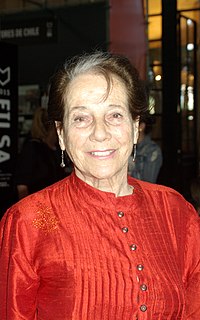 W
WMarjorie Agosín is a Chilean-American writer. She has gained notability for her outspokenness for women's rights in Chile. The United Nations has honored her for her work on human rights. The Chilean government awarded her with the Gabriela Mistral Medal of Honor for Life Achievement in 2000. She is a recipient of the Belpré Medal. In the United States, she has received the Letras de Oro, the Latino Literary Prize, and the Peabody Award, together with the United Nations Leadership Award in Human Rights.
 W
WIsabel Angélica Allende Llona is a Chilean writer. Allende, whose works sometimes contain aspects of the genre magical realism, is known for novels such as The House of the Spirits and City of the Beasts, which have been commercially highly successful. Allende has been called "the world's most widely read Spanish-language author." In 2004, Allende was inducted into the American Academy of Arts and Letters, and in 2010, she received Chile's National Literature Prize. President Barack Obama awarded her the 2014 Presidential Medal of Freedom.
 W
WCarmen Arriagada García was a Chilean writer.
 W
WMartina Mercedes Eugenia Barros Borgoño Lucia was a Chilean writer and a forerunner of feminism in Chile.
 W
WElena Caffarena Morice was a Chilean lawyer, jurist and politician. Contemporary historians and humanists consider her to be one of the most important 20th-century public figures in Chile.
 W
WInés Echeverría Bello (1868–1949) was a Chilean writer who used the pseudonyms Iris, Ines Bello, and Rainbow.
 W
WMonica Echeverría Yáñez was a Chilean journalist, writer, actress and a Literature professor. She defined herself as a feminist since "before people called it that" and called herself a "rebel" and "anarchist" in the face of the neoliberal economic course of the Chilean government.
 W
WMariela Griffor, is a poet, editor, publisher of Marick Press and diplomat. She is author of four poetry collections, Exiliana, House, The Psychiatrist and most recently, Declassified, and has had her poems and translations published in many literary journals and magazines including Poetry International, Washington Square Review, Texas Poetry Review, and Éditions d'art Le Sabord, in anthologies including Poetry in Michigan / Michigan in Poetry, from New Issues Press. A variety of Griffor's poems has been translated into Italian, French, Chinese, Swedish, and Spanish. She has been nominated to the Griffin Poetry Prize, to the Whiting Awards and the PEN/Beyond Margins Award. She was finalist and shortlisted for the 2017 National Translation Award for Canto General by Pablo Neruda.
 W
WCarmela Jeria,, was a labor activist, typographer, publisher, and social and feminist leader. Called the "first working journalist" of her country, she was the founder of La Alborada, the first feminist worker newspaper published in Chile.
 W
WPamela Jiles Moreno is a Chilean journalist and politician, currently serving as a member of the Chamber of Deputies, representing District 12 of the Santiago Metropolitan Region.
 W
WAmanda Labarca Hubertson, was a Chilean diplomat, educator, writer and feminist. Her work was directed mainly at improving the situation of Latin American women and women's suffrage in Chile.
 W
WAlejandra Matus Acuña is a Chilean journalist and writer. In 1999 she published El libro negro de la justicia chilena. The available copies of the book were confiscated one day before the planned release and Matus was accused by Servando Jordán, minister of the Supreme Court of Chile, of the delict of "desacato" ("contempt") invoking the article 6-B of the Ley de Seguridad del Estado. This prompted Matus to apply for—and receive—political asylum in the United States. The case led to the "desacato" article to be removed from the law with the new Ley de Prensa that was signed on May 25 of 2001 which allowed Matus to return to Chile. Despite the new law the book continued to be banned until October 2001 when the Corte de Apelaciones removed the ban.
 W
WLucila Godoy Alcayaga, known by her pseudonym Gabriela Mistral, was a Chilean poet-diplomat, educator and humanist. In 1945 she became the first Latin American author to receive a Nobel Prize in Literature, "for her lyric poetry which, inspired by powerful emotions, has made her name a symbol of the idealistic aspirations of the entire Latin American world". Some central themes in her poems are nature, betrayal, love, a mother's love, sorrow and recovery, travel, and Latin American identity as formed from a mixture of Native American and European influences. Her portrait also appears on the 5,000 Chilean peso bank note.
 W
WEliana Navarro Barahona was a Chilean poet. Her poetry was praised from an early date by literary critic Hernán Díaz Arrieta. Her poetry has been studied in various Chilean and foreign universities and her work appears in many national and foreign anthologies.
 W
WErnestina Pérez Barahona was a Chilean physician and feminist activist known for being one of the first female students of medicine at the University of Chile and for being the second woman physician in Latin America, graduating just days after Eloísa Díaz.
 W
WMargarita Pisano Fischer was a Chilean architect, writer, theoretician, and feminist belonging to the Movimiento Rebelde del Afuera.
 W
WCarola Saavedra is a Chilean-born Brazilian writer.
 W
WAlicia Scherson is a Chilean film director, screenwriter, and producer.
 W
WMarcela Del Sol is an Australian/Chilean writer. Born 10 July 1973 in Antofagasta, Chile, and who suffers dissociative identity disorder.